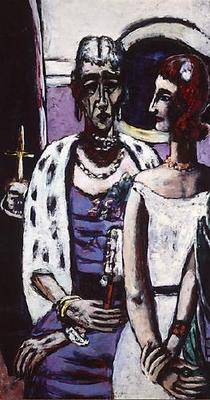
It's always nice to meet a new word, especially one which describes an activity you may have unwittingly engaged in here and there over time. My first published writings, in a student newspaper, were reviews of art shows. They led, by a number of tangled paths, many years later, to a book about the artist Philip Clairmont, whom I met as a direct consequence of one of those far off exhibition pieces. And it was through Phil's work that I came to look at Max Beckmann. Now, whenever and for whatever reason I go to the Art Gallery of New South Wales, I always make a point of going down the escalators to stand in front of the picture reproduced above. It's now called Mother and Daughter but when it was acquired by the gallery in 1987, its title was Old Woman in Ermine. Not sure what Max called it when he painted it in Amsterdam in 1946, where he lived from 1940-47 and from which he left to spend his last few years in the United States. The picture seems to me to be about how finally incommunicable the knowledge, experience, perhaps even wisdom that accrues to the old is to the young. How the ending of one world - Europe after the rain - nevertheless passes on the seed of destruction to the next. And how there is as much grandeur in defeat as there is splendour in the anticipation of victory. If that doesn't sound too portentous. It's a cool, even cold picture, all that white, and the blacks and greys and blues and purples with a chill, icy quality, as if encrusted with snow, even though there are gorgeous reds in the girl's hair and here and there elsewhere in the painting; but it also has something you find in many other of Beckmann's pictures, an hieratic sense, as if this were an image that could have been seen as readily in ancient times as in our own. Or indeed in any time, so long as it was a time when there were cities. And wars, because this is also a painting about war or at least about the aftermath and prelude of war. Here is something Beckmann wrote to his friend and biographer, Stephan Lackner, on 27 August, 1945: ... the world is pretty much destroyed, but the specters climb out of their caves and pretend to become again normal and customary humans who ask each other's pardon instead of eating each other up or sucking one another's blood. The entertaining madness of war evaporates and distinguished boredom sits down again on the dignified old overstuffed chairs ... It's always the hands I end up looking at - the old woman's, which seem to acknowledge the uselessness of all effort and yet hold upright the fan; the young woman's with that strange clutching of the wrist of one in the reversed palm of the other, as if the weariness the old woman feels is embryonic there in the unadmitted angst of the young. And then my eyes stray to the black and empty mirror behind, the cross to the left planted in what may be a skull, the dark and bloody curtain ...

2 comments:
ekphrastics, sirrah.
que sirrah, sirrah ...
Post a Comment